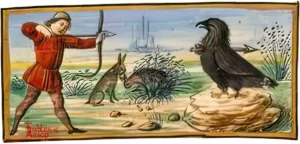An Eagle flying was hit by an Arrow. Looking back at it, the Eagle saw feathers from an Eagle on the Arrow. What a great irony!
We often give our enemies the means for our own destruction.

Eliot/Jacobs Version
An Eagle was soaring through the air when suddenly it heard the whizz of an Arrow, and felt itself wounded to death. Slowly it fluttered down to the earth, with its life-blood pouring out of it. Looking down upon the Arrow with which it had been pierced, it found that the shaft of the Arrow had been feathered with one of its own plumes. “Alas!” it cried, as it died, “We often give our enemies the means for our own destruction.”

JBR Collection
An Archer once feathered an Arrow with a feather that had fallen from an Eagle’s wing. It shortly afterwards happened that with this Arrow he shot the very Eagle that had cast the feather. In her mortal agony the Eagle recognised her property, and exclaimed, “Bitter is it to die, but doubly bitter to find that I have helped to speed the means of death!”

Townsend version
An eagle sat on a lofty rock, watching the movements of a Hare whom he sought to make his prey. An archer, who saw the Eagle from a place of concealment, took an accurate aim and wounded him mortally. The Eagle gave one look at the arrow that had entered his heart and saw in that single glance that its feathers had been furnished by himself. “It is a double grief to me,” he exclaimed, “that I should perish by an arrow feathered from my own wings.”

L’Estrange version
An eagle that was watching upon a rock once for a hare, had the ill hap to be struck with an arrow. This arrow, it seems, was feather’d from her own wing, which very consideration went nearer her heart, she said, than death it self.
Moral
Nothing goes nearer a man in his misfortunes, then to find himself undone by his own folly, or but any way accessory to his own ruine.

Gherardo Image from 1480

Aquila et Sagitta
Sagittarius in aquilam collimabat et, missa sagitta, confixit aquilam. Cumque, conversa ad sagittam, aquila eam quoque pennatam suis videret esse pennis, “Multis,” inquit, “suae propriae facultates et res insidias et periculum creant.”
Perry #276
